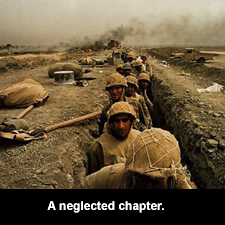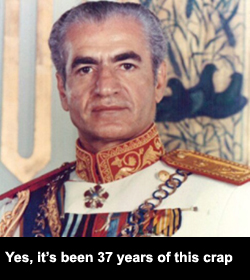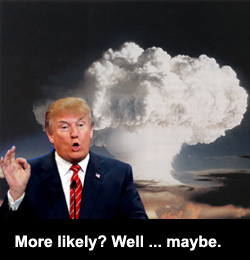As I’ve mentioned more times than I should have, I have had very low expectations for the Biden foreign policy since the beginning. By “the beginning”, I mean well before his election, when you couldn’t find foreign policy positions on his campaign web site for love or money. Biden’s fifty-year track record on foreign affairs is not a particularly good one. I remember him saying he was “ashamed” of Reagan’s “constructive engagement” policy towards apartheid South Africa back in the 1980s. Um …. that’s about it.
These past two weeks have done little to change my mind on this. The drone assassination of Ayman al-Zawahiri, the al Qaeda leader, prompted a lot of fist-pumping on the part of mainstream Democrats and some never-Trump Republicans. A similar amount of jingoism accompanied House Speaker Nancy Pelosi’s visit to Taiwan, as well. I’m not certain what the expected takeaway is for either of these decisions, but it the point was to demonstrate beyond a shadow of a doubt that the current Democratic leadership is well vested into America’s imperial enterprise, they certainly succeeded.
A child of bad policy
Ayman al-Zawahiri was a terrible person, there’s no question. I think, though, as we are the one global super-power, it’s probably a good idea to consider how our policy may have contributed to his no-goodness. Al-Zawahiri started down the road to al Qaeda when he was imprisoned by the Mubarak regime, where he and his fellow prisoners from Egypt’s Muslim Brotherhood were tortured, killed, and otherwise abused. Egypt, I will remind you, has long been a major recipient of U.S. aid, far beyond what nearly every other nation has received from us. If Egypt’s notoriously brutal prison system contributed to al-Zawahiri’s radicalism (which it most certainly did), we bear considerable responsibility for that.
Secondly, there likely wouldn’t have been an al-Qaeda for him to join up with if it hadn’t been for (1) the Afghan CIA operation during the 1980s, and (2) the first gulf war in 1990-91, when U.S. troops were stationed in Saudi Arabia for the first time, remaining there long after Iraq was driven from Kuwait. Again, these were policy choices, not forces of nature. Without multiple interventions in the middle east and southwest Asia, America might not have been such a big, attractive target for these people. Can’t be sure, but …. might have been worth a try.
Worst of the worst?
Then there’s the question of how many lives were lost at the hands of al-Zawahiri. I would argue far too many. As Rachel Maddow pointed out on her show last week, he had a long history of planning terrorist actions, including being one of the masterminds of the September 11 attacks, the bombings in Kenya and Tanzania in 1998, the U.S.S. Cole in 2000, and so on. So, thousands of live lost. Not a nice person, right?
Now, there should be some reckoning as to how that record stacks up to the record of his pursuers. All killing is intrinsically bad, so I’m not suggesting that the rapacious policies of the United States somehow lessen the severity and the cravenness of al-Zawahiri’s attacks. But if it’s bad when he does it, then it’s bad when others do it as well, right? And if others do a lot more killing than he did, well … that makes them particularly bad, right?
Let’s just stick to the wars that followed 9/11. How many people died as a result of our actions? Was it less or more than the number of al-Zawahiri’s victims? In all honesty, America’s victims through this period run in the high six-figures to perhaps seven figures. Several countries were destroyed essentially beyond recovery. Fist pump, anyone?
Unfair comparisons
Okay, I know …. it’s really not fair to compare nation states like the U.S. to non-state actors like al Qaeda or individuals like al-Zawahiri. Nation states have international obligations, responsibilities, and should at least formally be accountable to their populations. Terror networks are kind of a law unto themselves, though international law does bear on them. But honestly …. shouldn’t we expect more out of our own government then that they should be responsible for hundreds or even thousands of times the number of deaths caused by our most ruthless enemies?
Seems like kind of a low bar.
luv u,
jp


 One such story is the Iran-Iraq war (1980-88). which I have mentioned previously in the blog over the years. This, in my opinion, is one of those seminal conflicts that set the stage for much that followed in this unfortunate region. The United States and U.S. allies in Europe and the Persian Gulf (particularly Saudi Arabia and the UAE) played a central role in this horrendous war, a role which has virtually been expunged from pop culture history. One example is the
One such story is the Iran-Iraq war (1980-88). which I have mentioned previously in the blog over the years. This, in my opinion, is one of those seminal conflicts that set the stage for much that followed in this unfortunate region. The United States and U.S. allies in Europe and the Persian Gulf (particularly Saudi Arabia and the UAE) played a central role in this horrendous war, a role which has virtually been expunged from pop culture history. One example is the This transparent political ploy prompted some complaints among talking heads that this was in some way unprecedented. Nothing could be further from the truth. The national anthem, the flag, all of these superficial patriotic symbols have been used for political purposes pretty much my entire life through. Nixon rolled out the flag all the time, as did Reagan. The now-sainted George H.W. Bush made the pledge of allegiance a kind of litmus test for patriotism during the 1988 election. And protests like flag-burning become a major culture-war issue from time to time, particularly when the Republicans are in power and they have little else to complain about (because they’re getting their way).
This transparent political ploy prompted some complaints among talking heads that this was in some way unprecedented. Nothing could be further from the truth. The national anthem, the flag, all of these superficial patriotic symbols have been used for political purposes pretty much my entire life through. Nixon rolled out the flag all the time, as did Reagan. The now-sainted George H.W. Bush made the pledge of allegiance a kind of litmus test for patriotism during the 1988 election. And protests like flag-burning become a major culture-war issue from time to time, particularly when the Republicans are in power and they have little else to complain about (because they’re getting their way). Well, now the “war on Christmas” crew has a prominent new spokes-moron: President-elect Donald Trump, who has made a point of pushing Christmas at all of his victory tour rallies across the country. You’ve probably seen it – big “Merry Christmas” sign on the front of his podium, lines of Christmas trees behind him. At
Well, now the “war on Christmas” crew has a prominent new spokes-moron: President-elect Donald Trump, who has made a point of pushing Christmas at all of his victory tour rallies across the country. You’ve probably seen it – big “Merry Christmas” sign on the front of his podium, lines of Christmas trees behind him. At  Gary Johnson, on the other hand, is clearly not the brightest ex-governor on the porch and hasn’t made much of a case for why young people should give their vote to a ticket that’s floated in part with Koch money, most likely. Perhaps his supporters are not aware that he would slash spending on just about any program that ever benefited them in any way. If American style libertarianism is about anything, it’s about that. Not that it’s likely to be much of a problem – he, like Stein, have no conceivable path to victory in this election. All they have is an extraordinary opportunity to hand Donald Trump and the hyper-reactionary Republican party an electoral victory this November that they don’t deserve and that will have repercussions for many years to come.
Gary Johnson, on the other hand, is clearly not the brightest ex-governor on the porch and hasn’t made much of a case for why young people should give their vote to a ticket that’s floated in part with Koch money, most likely. Perhaps his supporters are not aware that he would slash spending on just about any program that ever benefited them in any way. If American style libertarianism is about anything, it’s about that. Not that it’s likely to be much of a problem – he, like Stein, have no conceivable path to victory in this election. All they have is an extraordinary opportunity to hand Donald Trump and the hyper-reactionary Republican party an electoral victory this November that they don’t deserve and that will have repercussions for many years to come. First, the $400 million is not our money; it is Iran’s money. It represents funds paid by the Iranian people for arms sold to the despotic Shah before his overthrow; the arms were never delivered, and with the application of sanctions, the money was frozen, like the proceeds from oil sales. As a component of the nuclear deal, the United States and its partners agreed to free up this money while keeping the bulk of the sanctions in place. Once the agreement was settled, the administration apparently reserved delivery of these funds – the $400 million in cash, since Iran still can’t use the international banking system – as some surety that the prisoner release (negotiated as a side agreement) would actually happen.
First, the $400 million is not our money; it is Iran’s money. It represents funds paid by the Iranian people for arms sold to the despotic Shah before his overthrow; the arms were never delivered, and with the application of sanctions, the money was frozen, like the proceeds from oil sales. As a component of the nuclear deal, the United States and its partners agreed to free up this money while keeping the bulk of the sanctions in place. Once the agreement was settled, the administration apparently reserved delivery of these funds – the $400 million in cash, since Iran still can’t use the international banking system – as some surety that the prisoner release (negotiated as a side agreement) would actually happen. Does this bother the Republican establishment? Not at all. They get a little bothered by his off-hand comments and rejoinders to everyone who looks askance at him. Overt racist policies, ethnic cleansing, etc., inspires mild concern. I think the turning point was Trump’s reluctance to endorse Paul Ryan and other prominent Republicans – that’s getting their attention, and now the party is openly looking for ways to rein him in or read him out. I don’t think either will happen, frankly. His fellow Republicans worry about their seats, not about the planet – they don’t care that this hyper narcissistic man-baby who seems to have a fascination with nuclear weapons might become president.
Does this bother the Republican establishment? Not at all. They get a little bothered by his off-hand comments and rejoinders to everyone who looks askance at him. Overt racist policies, ethnic cleansing, etc., inspires mild concern. I think the turning point was Trump’s reluctance to endorse Paul Ryan and other prominent Republicans – that’s getting their attention, and now the party is openly looking for ways to rein him in or read him out. I don’t think either will happen, frankly. His fellow Republicans worry about their seats, not about the planet – they don’t care that this hyper narcissistic man-baby who seems to have a fascination with nuclear weapons might become president.